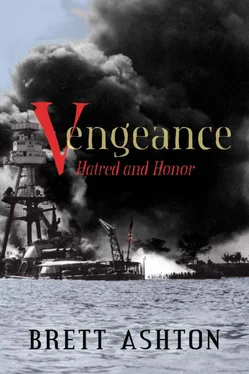I tried to avoid tapping nervously on the pearl grips of my Colt forty-five as I rested my hand on it and waited for the signal from the major that either all was well, or it was time to fight. As the captain in a potential combat situation, you don’t have the luxury of letting the crew know how nervous you really are.
The seconds turned to minutes, and I waited.
After awhile, the major came back above deck and gave a hand signal that everything was well. I watched another marine come out of the hatch on the conning tower behind the major and climb down the ladder, cross the deck and head for the liberty ladder back to my ship. A few seconds later, I was facing a slightly out-of-breath marine sergeant who handed me a hand written note.
Thanking the sergeant and dismissing him, I read the note:
Have secured enemy sub. Fuel supply extremely low. Batteries the same. No detectable hidden purpose yet but still involved in searching the sub. Japanese captain and officers cooperating in every way. Captain speaks English well, attended University of Chicago. Expect ten more minutes to finish.
University of Chicago? I just couldn’t believe my eyes. Apparently everything good the Japs ever learned came from America. And those slant-eyed sons-of-bitches turned around and used it to bomb us. “Isn’t that about right?” I said out loud, no longer able to contain myself.
“Sir?” the officer of the deck replied.
“Major Johnson tells me the Jap bastard captain of that sub went to the University of Chicago.”
“Really?” replied the lieutenant.
“Yes, apparently so. We should have just shot him when we had him the first time, don’t you think, Lieutenant?”
“Would have been a good idea, sir,” he said with a grin. “We could have saved all of those American war bond holders a lot of money on perfectly good ammunition since.”
“No doubt,” I replied, ending the conversation.
And the seconds once again turned into minutes. I gently tapped the grip of my holstered Colt forty-five.
After a short time, the marine sergeant returned to the bridge bearing another note from the major. I took it from him and told him to stand by while I read it.
Enemy sub secured. All weapons disabled and inert. The Japanese captain respectfully requests to come aboard and formally surrender.
“Sergeant,” I said, “run ahead and inform the major I will be on the quarter deck at the top of the liberty ladder in two minutes.”
“Yes, sir,” replied the marine; then, he departed the bridge.
I picked up the sound-powered phones that connected the bridge to the executive officer’s battle station, put them on, and keyed the microphone. “XO,” I said.
“Yes, sir,” came the usual acknowledgement of Commander Thompson’s voice.
“I’m leaving the bridge to go accept the sub captain’s surrender. You have the conn. Look sharp and keep your eyes peeled. I don’t trust these bastards.”
“Understood,” the executive officer said.
“Officer of the deck, XO has the conn. I’ll be back in ten minutes.”
“Yes, sir. The captain’s off the bridge.”
I turned, stepped through the hatch, then down the ladder and for the first time in weeks left the bridge area of my ship.
I arrived at the top of the ladder down to the sub just before the major and a Japanese officer with a samurai sword stepped onto it and began to climb up the steps.
Then they were at the top of the ladder. Ten feet in front of me. Five. Then three.
The Japanese officer reached for his sword. I shot a quick glance at Major Johnson as I felt the snap on the strap of the holster that held my Colt forty-five pop loose against my index finger. Ever so slightly, the major shook his head at me, his eyes slightly widening, as if reading my mind.
The Japanese captain unhooked the sword from his belt, still sheathed, bowed and holding it horizontally, offered it to me.
This was the first time in more than four years I had seen a Jap surrender without shooting at him first.
So as my sworn enemy stood in front of me, defeated and offering his sword, and me with my hand still on my forty-five, I began to feel I was missing something, something vague yet very important. I had planned and hoped for this day for some time now, and yet when the moment finally arrived, it seemed hollow somehow.
A nebulous idea began to form in my thoughts, small at first but growing, very rapidly, gaining energy like an avalanche, until it totally wiped out any concept of the things I had previously assumed were true. I found my mind suddenly racing backwards across time, looking through all of the events of the war that had led me to this point…
Until finally, in my mind, I found the old chief from the day I visited the dead hulk of the battleship Oklahoma . For a moment, it was almost as if he was standing there with us, looking at me, asking the question which had unexpectedly burned to the very core of my soul. “What are you looking for, captain?” And like a flash, the answer to his question finally came to me: “Peace, chief. I’m looking for peace.”
And as I took the sword from the Japanese captain’s outstretched hands, I began to wonder if maybe it was as much me shooting at them which made me hate them, as it was them shooting at me.
About seventy to seventy-five years ago, I was in the prime of my life. I was a United States naval officer. I was a young and handsome man chasing the pretty skirts around Hawaii. Your American tax dollars hard at work! (The admiral added a wink and a grin at this point.) It was a lot of fun being a sailor in paradise in the thirties. I almost got into a bit of trouble from time to time, but overall, I kept my nose clean and my mind was mostly on my career, then later my family. But I was also brash and arrogant, which was normal enough for a young sailor of those days. It was in every way an unspoiled paradise for me.
And then came the Japanese.
I was on three ships during the war and commanded one of them.
All three of those ships combined got struck by no less than twelve torpedoes, one which sank with a third of the crew still on board.
Torpedoes were among the most incredibly violent devices you could possibly imagine at the time. Most smaller ships that were hit by them amidships blew right in half. Even the smaller aerial-launched ones could almost lift a ten thousand-ton cruiser like the Buffalo out of the water. Each one sprays thousands of sharp jagged pieces of metal everywhere that will cut through the human body like a bullet through butter. It doesn’t take that many torpedoes to get your attention and set you to wondering how this could keep happening to you.
The tricky thing about it is if you’re not careful enough to keep your wits about you, your life will change for the worse, and you won’t even notice until it’s too late. You will be too busy thinking that you’re right, they’re wrong, and won’t see the truth, even when it bites you in the ass.
As a part of military life, you are trained to be ready for anything at any time. You are always in preparation for some unseen enemy, just over the horizon, just out of your reach, waiting for the chance to attack you and kill you if possible. “What would you do if we were attacked right now?” is the total mode of operation and way of life.
You think about it and drill for it, all the time. And at the same time, you don’t think about it because somehow it just seems too terrible and unreal of a thing to do to other human beings. But you continue doing it because they are the enemy and orders are orders. They are different than you, and sooner or later, they will attack you.
Читать дальше












